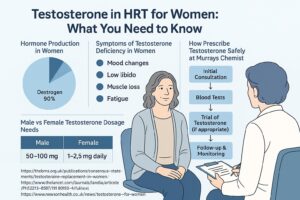Benefits, Risks & What to Expect
Jaydev Varsani – Clinical Prescribing Pharmacist

When we talk about Hormone Replacement Therapy (HRT), most people think of oestrogen and progesterone. But there’s another key hormone that often gets overlooked: testosterone. Although commonly associated with men, testosterone also plays a vital role in women’s health. At very low levels, it supports energy, libido, mood, and even cognition.
Growing clinical evidence suggests that testosterone, when used appropriately, can help certain women—especially postmenopausal women—who are struggling with symptoms that aren’t resolved by oestrogen alone. This blog explores why and how testosterone may be used in HRT for women, the importance of clinical assessment and monitoring, and what current guidance says.
Why Do Women Need Testosterone?
While women produce significantly less testosterone than men, it still plays a critical role. Produced by the ovaries and adrenal glands, testosterone supports:
- Sexual desire and arousal
- Muscle strength and tone
- Bone density
- Mood and emotional stability
- Mental sharpness and motivation
As women age, particularly after menopause, testosterone levels fall. For some, this can lead to low libido, fatigue, cognitive fog, and reduced muscle tone—all symptoms that are often mistakenly attributed solely to oestrogen deficiency.
What Does the Evidence Say?
There is a growing body of evidence supporting the use of testosterone therapy in women:
- A 2019 Global Position Statement published in The Lancet concluded that testosterone can significantly improve sexual wellbeing in postmenopausal women with hypoactive sexual desire disorder (HSDD).
- The British Menopause Society (BMS) has issued a consensus statement supporting testosterone as a treatment option for HSDD in women after appropriate clinical evaluation.
- Clinics such as Newson Health routinely use testosterone in carefully selected women with excellent outcomes, including improved mood, energy, and sexual function.
The Importance of Assessment and Blood Testing
Testosterone should never be prescribed without proper evaluation. At our clinic, the process typically includes:
- Initial consultation to discuss symptoms, medical history, and current HRT (if any)
- Comprehensive blood tests measuring:
- Total testosterone
- Free testosterone
- SHBG (sex hormone-binding globulin)
- Oestradiol, FSH, LH
- Thyroid and other relevant markers
- Diagnosis and treatment plan tailored to the individual
Why Low Doses Work in Women
Women need only a tiny fraction of the testosterone prescribed to men. For example:
| Hormone | Average Male Dose | Typical Female Dose |
|---|---|---|
| Testosterone Gel | 50-100mg daily | 1-2.5mg daily |
Even these small doses can be life-changing, helping restore balance without pushing levels into a risky range. Because the female body is highly sensitive to androgens, less is more.
Why Monitoring Matters
Once started, testosterone therapy must be carefully monitored. This includes:
- Repeat blood tests after 3 months and annually
- Symptom tracking to evaluate efficacy
- Adjusting the dose to stay within physiological ranges
The goal is to bring testosterone to a normal premenopausal range—not above it. Regular reviews also help catch any side effects early.
Possible Side Effects
Most women tolerate testosterone well when it’s dosed and monitored correctly. However, potential side effects include:
- Acne or oily skin
- Increased facial hair
- Mood changes or irritability
- Voice deepening (rare)
- Clitoral enlargement (very rare)
These are more likely at higher than recommended doses and are typically reversible if caught early.
Long-Term Considerations
The long-term safety profile of testosterone in women is still being studied, but current evidence indicates that it may:
- Improve bone density
- Support sexual and cognitive wellbeing
- Reduce risk of osteoporosis
- Improve quality of life
That said, testosterone is currently unlicensed for use in women in the UK, though it is widely prescribed off-label by qualified clinicians in accordance with guidance from the BMS and NICE.
Final Thoughts
Testosterone therapy for women isn’t about ‘male hormones’ or muscle-building — it’s about restoring what the body naturally produces in small amounts and what some women may be lacking.
If you’re struggling with symptoms like low libido, fatigue, or mental fog despite being on HRT — or if you’re exploring hormone support for the first time — testosterone might be a missing piece of your hormone puzzle.
Interested in exploring your options?
Murrays Chemist offers:
- Comprehensive hormone blood testing
- Personalised HRT and testosterone assessment
- Ongoing monitoring and support
Book a consultation to discuss your needs in a supportive, evidence-based environment.
